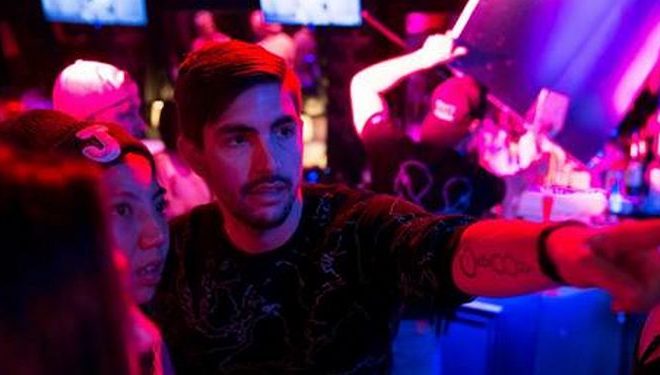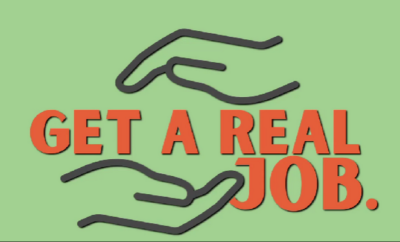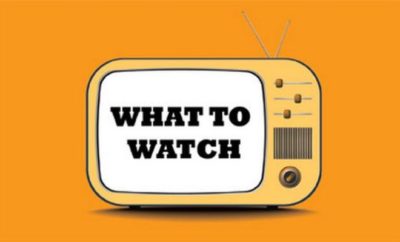
Interviews
Alden Peters – Femme
By: Lisa Steinberg
Q) How does the lighting and cinematography help to play up and add to the build up of the themes and the undertones of the movie?
A) The cinematography and lighting is crucial to establish the mood and tone, and show how the characters are feeling. Everything you see in the frame was crafted by a whole team: our cinematographer Arina Bleiman, our production designer Jane Ji and our colorist Mary Perino. Those three took my overall concept of the look and feel of the film and made it a reality. And they did such an incredible job. The idea was to depict New York City through Carson’s eyes —a world filled with pink.
Q) When you were approached about directing Femme, what was it that really drew and connected you with the film?
A) It was Corey [Camperchioli] himself that drew me to the project. Hands down. Hearing him speak about the film and WHY he wanted to make it had me sold, immediately. It’s the type of project with purpose and with heart that you dream of working on. Corey is an incredible talent I’ve known for a few years and so I jumped at the opportunity to bring his vision to life. There was an energy to this project from the beginning that felt bigger than the film itself. It was a movement to #FreeYourFemme from the very beginning. From the first draft of the script I read, there was an honest vulnerability to Carson’s story that drew me into his world. There was heart without being overly sentimental. That’s the fine line I enjoy playing in.
Q) How did your vision for the film and Corey’s come together?
A) I don’t think we ever had separate visions — instead we worked together and brought our two sets of skills to the table to sculpt the same vision. From the very beginning Corey had such clarity with what he wanted the film to be and what he wanted it to do. My job was to download all of those goals and figure out how to articulate those ideas through film. From the tone, to the color palette, to the music and sound design, those were things I brought to the table to communicate Corey’s vision to an audience.
Q) What did you find to be the most challenging aspect about filming?
A) Our shoot was very short, only three days. We are so lucky to have such amazing talent in the film, but it was a puzzle to put the puzzle of their schedules together with the shoot schedule we had. Aja [Rivera] was fresh off of All Stars 3 of RuPaul’s Drag Race. Derek Klena shot his scene before heading to his even show as the prince in Anastasia on Broadway. Stephanie Hsu was also on Broadway in the Spongebob Squarepants musical (and now, in the sensational Be More Chill). Johnny Sibilly went on to absolutely slay his performance on FX’s Pose. Producer Benno Rosenwald, co-producers Johan Matton and Linnea Larsdotter, and 1st AD Rachel Morgan worked their magic to make it all work!
Q) What are some of the touches you brought to the film that maybe not at the first eye you would see but helped add meaning and depth to the project on second seeing?
A) One of my absolute favorite hidden treasures of the film came from our composer Ben Ash. Ben composed the music using only instruments that boys get made of for playing because they’re “girly” — violin, flute, harp, etc. It’s something you wouldn’t notice but to me makes the film that much richer with purpose and meaning. For the direction, I brought the overall tone to the film. I wanted to add a touch of absurdity because I’ve always felt the absurdity in Broad City authentically captured New York City better than most interpretations of the city. I wanted to do that with single life and dating via apps in NYC. It makes no sense why we subject ourselves to the body shaming and femme shaming and racism ingrained in dating app culture. But I wanted to explore that with levity and embrace the absurdity, so we can call it out without sounding preachy. Our editor Tovah Leibowitz is an editor on Broad City and fully brought the Broad City vibes to the edit.
Q) The film is being adapted into a series, what kind of broader landscape do you the adaptation brings to the TV series?
A) I am SO THRILLED we’re adapting Femme into a series. There is so much more story to tell. Finding self-love in a self-obsessed app culture in New York City is a hell of a struggle. With a series, we can explore all the many, many obstacles in Carson’s way. I’m excited to bring that journey to fruition. I’m also excited to flesh out the supporting characters from the film into dynamic, complex people with their own story arcs, as well as add new characters in Carson’s world. There is an opportunity to explore experiences of gender expression and sexism from across a larger spectrum of the queer community. To explore complex relationships with the world “femme.” It’s going to be excellent.
Q) Rachel Brosnahan has signed on to executive produce the TV series adaptation. What do you hope or think she will bring to the development and broader scope of the TV series?
A) Rachel Brosnahan has been tirelessly supportive of the film and now the series adaptation as well. It’s incredibly humbling to see her have astronomical success in her career and still take the time to support Corey and this project. I look to her as a guiding light of how to use success as a platform to lift others up and share that success with up-and-coming artists. She’s in invaluable part of our team.
Q) How does Femme keep a steady balance between heart, lessons, reflection and humor?
A) The start of that balance is in Corey’s writing. He has great intuition with how far to take a scene in any direction. We finalize that balance in the edit — when do we hold on a character and when do we rapidly cut? When does the music accentuate the humor and when do we let there be awkward silence? We tweak and tweak and tweak until the balance is right.
Q) With the current political climate, how can we continue to amplify queer voices, push boundaries, and provide a broader landscape and platform for diversity?
A) Streaming services like Revry (where you can watch Femme!) are key. Revry amplifies authentic voices from across the queer community. We need more streaming services who will do that. We need more networks who will fill writers’ rooms with queer writers and writers of color and women writers — not just for the sake of diversity, but because the experiences and talents of those writers are crucial to depicting authentic experiences. We need queer showrunners and directors to get their projects greenlit. And for those of us lucky enough to find success in our careers, we need to reach down and lift others up with us.
Q) What do you hope that viewers take away when watching?
A) The overall message of this film is to love yourself. To love yourself exactly as you are and find power in what society tells you is wrong about you. That’s a tall order. It’s something we all struggle to do, myself included. But one of the first steps is to see characters we look up to go on that journey, so we can find ways to follow in that path. Corey is a shining light of self-love, both on screen and in real life. I hope that viewers inspired in the same the way I have been inspired by working with Corey.





You must be logged in to post a comment Login